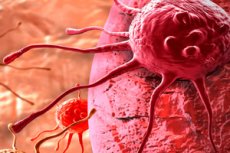Medical expert of the article
New publications
You can block the lymphogenic spread of cancer
Last reviewed: 02.07.2025

All iLive content is medically reviewed or fact checked to ensure as much factual accuracy as possible.
We have strict sourcing guidelines and only link to reputable media sites, academic research institutions and, whenever possible, medically peer reviewed studies. Note that the numbers in parentheses ([1], [2], etc.) are clickable links to these studies.
If you feel that any of our content is inaccurate, out-of-date, or otherwise questionable, please select it and press Ctrl + Enter.

Scientists from Germany have found an antibody that affects lymphatic vessels in cancerous growths in rodents. It turns out that malignant cells will not be able to spread through damaged vessels to other parts of the body and form metastases there. Specialists are continuing the study they have started, now involving volunteers, since if it is successful, it will be possible to prevent serious complications in the form of metastasis.
Both healthy and tumor structures have blood and lymph circulation systems: immune cells are transported through the corresponding vessels. Scientists have long proven that malignant particles are capable of moving through the vascular network and depositing as metastases in other parts of the body. Researchers at Heidelberg University have begun a detailed study of the biological mechanisms that could prevent such spread.
"We transferred a piece of tumor tissue directly from one rodent to another. In one case, there was a preserved natural tissue structure in which the malignant tumor could form functional lymphatic vessels connected to the general lymphatic network, which created a risk of lymphatic metastasis," said co-author Dr. Gengenbacher.
Experts explained that malignant cells often move through the lymphatic vessels: first to the lymph nodes, and then to vital organs. A surgical operation to remove the mother tumor helped scientists simulate a realistically possible situation. To study in more detail the methods of preventing the spread of metastases, scientists began working with lymphatic endothelial structures lining the internal vascular cavity. Such structures provide some important capabilities of the vessels, produce multiple signal molecules with growth factors. Experts were able to discover that the signal peptide angiopoietin-2 determines the survival of lymphatic endothelial structures in malignant tumors. An antibody that inhibits the signal peptide provokes necrosis of the lymphatic vessels, which blocks the spread of the tumor. As a result, significantly fewer secondary tumors are formed in the body, and the patient's survival rate increases.
This problem is really important for modern medicine. After all, tumor spread in the form of the process of formation of secondary foci of cancer growth is the main criterion of malignancy of the neoplasm and, accordingly, the survival of patients. The size of metastases starts with one cell, and in the early stages they cannot be determined using conventional diagnostic methods. Over time, such small metastases transform into full-fledged tumors. By the way, it is metastasis that leads to the death of cancer patients in 90% of cases.

